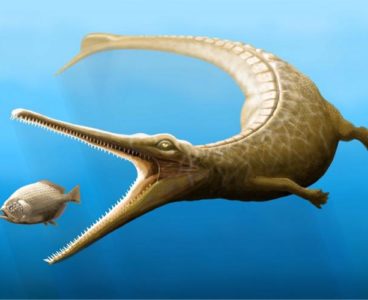
Fault Lines are no Barrier to Safe Storage of Carbon Dioxide Below Ground
Carbon dioxide emissions can be captured and securely stored in underground rocks, even if geological faults are present, research has confirmed. There is minimal possibility of the gas escaping from fault lines back into the atmosphere, the study has shown. The findings are further evidence that an emerging technology known as Carbon Capture and Storage…
Skull Scans Tell Tale of How World’s First Dogs Caught Their Prey
Analysis of the skulls of lions, wolves and hyenas has helped scientists uncover how prehistoric dogs hunted 40 million years ago. A study has revealed that the first species of dog – called Hesperocyon gregarius – pounced on its prey in the same way that many species, including foxes and coyotes, do today. The findings…
Nano-Scale Process may Speed Arrival of Cheaper Hi-Tech Products
An inexpensive way to make products incorporating nanoparticles – such as high-performance energy devices or sophisticated diagnostic tests – has been developed by researchers. The process could speed the commercial development of devices, materials and technologies that exploit the physical properties of nanoparticles, which are thousands of times thinner than a human hair. The particles’…
Intense Tests Reveal Elusive, Complex Form of Common Element
An unusually complex form of one of the most abundant chemical elements on Earth has been revealed in the lab for the first time. Researchers created a crystallised version of nitrogen – which at normal conditions is the main constituent of air – by subjecting it to extreme pressures and temperatures. The study shows for…
Immune Cells Could Hold Key to Therapies for Spinal Cord Injuries
Key Gene Find Could Enable Development of Disease-Resistant Crops
Advances in Sensors Aid Warfighters
Technology that can process vast streams of information from military intelligence sources is being developed by scientists and engineers. The development will seek to enable operatives in the field to assess their surroundings and identify threats more quickly and accurately. Newly developed systems will gather information from a wealth of sources in modern conflict, interpreting…
Power of Tiny Vibrations Could Inspire Novel Heating Devices
Laser Experiments Lend Insight Into Metal Core at Heart of the Earth
Drug Hope for Dementia and Stroke
Jurassic Fossil Tail Tells of Missing Link in Crocodile Family Tree
A 180 million-year-old fossil has shed light on how some ancient crocodiles evolved into dolphin-like animals. The specimen – featuring a large portion of backbone – represents a missing link in the family tree of crocodiles, and was one of the largest coastal predators of the Jurassic Period, researchers say. The newly discovered species was…
Painkillers in Pregnancy May Affect Baby’s Fertility
Liver Study Offers Insights into Hard-to-treat Diseases
Algae Could Feed and Fuel Planet With Aid Of New High-Tech Tool
Nano Robots Venture to Hard-to-Reach Areas of Body
Tiny, remotely operated robots could be designed to diagnose and treat illness in hard-to-reach areas of the human body, research suggests. In tests, a swarm of robots measuring a few millionths of a meter long — about the size of a blood cell — were guided magnetically to sites in the stomach of rats. The…
Space Dust May Transport Life Between Worlds
Africa-Led Research to Tackle The Challenge of Infectious Diseases
Hardy Coral Make Their Moves to Build New Reefs from Scratch
Resilient species of coral can move to inhospitable areas and lay the foundations for new reefs, a study shows. Scientists have discovered that these tough, mobile corals can create their own stable habitats, which act as a base upon which other species can attach and build reefs. These hardy corals – known as coralliths –…
World’s Largest Volcanic Range May Lurk Beneath Antarctic Ice
Gold Specks Raise Hopes for Better Cancer Treatments
A tiny medical device containing gold specks could boost the effects of cancer medication and reduce its harm, research suggests. Scientists have completed a study which showed that gold increased the effectiveness of drugs used to treat lung cancer cells. Experts say that the findings could help researchers use the device to reduce side effects…



















